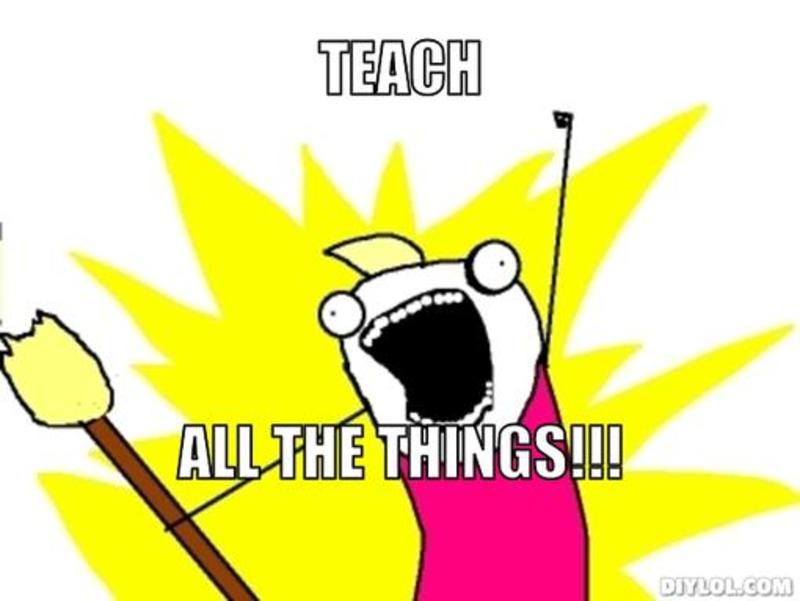Lucky 13
 |
| This year, it's more like, "TEACH SOME OF THE THINGS THAT I HAVE THE STAMINA FOR!!!" Photo credit. |
This is year 13.
Lucky 13.
This is the 13th year I've been an educator in a public high school setting. Many of the students I've taught are low-level readers who, for a variety of reasons, haven't scored at grade level on our state's reading assessment.
As a result, they generally feel beaten-down, bedraggled, and burdened when they have to read.
If you're not an educator, you may be wondering, "What?! There are teens who have trouble reading?!?!?!"
Yep.
Some of the reasons why include:
As a result, they generally feel beaten-down, bedraggled, and burdened when they have to read.
 |
| TFW you're just trying to empower your students with some education but they hate it. Photo credit. |
Yep.
Some of the reasons why include:
- Learning Differences - Not everyone learns the same. No judgment. It's the truth. If you're not taught in a way that helps you learn, then learning isn't likely to occur.
- Reading Processing Issues - While I have taught a handful of actually-diagnosed students with dyslexia, there are a host of other processing issues that impede a person's ability to comprehend what they read.
- Lack of Maturity - In other words, they haven't developed the reading stamina and "fix-up" strategies that mature readers use automatically, AND/OR their low interpersonal maturity makes it difficult for them to sit and learn in a traditional classroom setting.
- Poverty - Let's say your single-parent household is struggling to make ends meet. Your parent is having trouble putting food on the table and she's working 2 jobs just to keep a roof over your heads. She works so much that you have to take care of your younger siblings. She is exhausted all the time and doesn't have the energy to check on your homework, communicate with your teachers, or check your grades.
- An Interrupted Education - Some students have sat in literacy classrooms, sometimes for multiple years, in which they had no permanent teacher. I've taught many students who never really learned phonics, and as a result, they have trouble sounding out words, understanding what they mean, etc.
- They are new to the English language - AKA, they are ELLs.
- Family problems - Family is HUGE. From my experience, this is probably the #1 reason why students aren't successful readers. This is not to push blame onto parents, (Lord only knows, it's hard enough raising a child - nobody needs parent-shaming on top of that) but rather to express that familial instability creates traumatic situations that push education back to a lower set of priorities.
Most often, there is a mixture of the list above that stunts a student's reading development. And that isn't even an exhaustive list. It's just what I've frequently observed over the course of my career.
And my school is in an affluent region. Let that sink in.
 |
| Teacher's fantasy. Photo credit. |
And my school is in an affluent region. Let that sink in.
At this point, the amount of students whose names AND faces I can easily retrieve from 13 years of memory is dwindling. Several stand out for one reason or another. Maybe they had a funny habit. Maybe we solidified a connection as humans. Maybe their parents' actions make them stand out in my mind.
What I hope is that at some point, I gave them something beyond an education, something more special and intrinsic than "book-learnin'." (Don't get me wrong - literacy is my bread and butter, but one tends to remember more about how a teacher reacted to a classmate's fart during a test than the themes in To Kill a Mockingbird.)
I've had low moments before during my career, but this year really stands out.
 |
| Me, trying to figure out how to successfully adult this year. Photo credit. |
Here's why:
1. I'm resuming regular classroom instruction after three years as an instructional coach. For three years, my job was to shape the instructional culture of my campus. Calling parents, managing a classroom, and daily lesson planning and grading weren't a part of my life for a while.
2. My preps (the various courses I teach) has never been higher - 3. While that may seem minuscule, keep in mind that:
- 2 of these preps are fragile populations (English for Speakers of Other Languages and low-level readers),
- within one of those preps, my curriculum expects me to teach one lesson to the whole class of 33 students, then three lessons targeted to specific groups of students who have been diagnosed with a particular reading deficiency, (Side note: I did this for years, and while it wasn't a cake walk, I still did it.),
- to teach English to Speakers of Other Languages, I must prepare 2 different lessons each day to adjust for students of higher or lower English language ability,
- Fun example from the other day: I taught one group how to use the words, "has" and "have" in a sentence, while I taught another group the meanings of the words "naive" and "circumstance."
- 1 of these preps is honors, which contains some (but not all) higher-ability students,
- and finally,
- regular English.
So. . . that's a lot.
But wait! There's more!
3. I'm dealing with my own personal stuff relating to post-adoption trauma and family issues.
 |
| "Hey guys, so I was impossibly sad last weekend because I just remembered that I was kidnapped as an infant, am a secret to my siblings, and rejected from my homeland, so just read on your own and here's a quiz NBD." Full disclosure: I work very hard EVERY DAY to NOT do this, which is why general self-care has been pretty hard to come by recently. Photo credit. |
But this year is beating me down. Hard.
I've gotten to the point where I don't feel the old joy when lesson planning. The pistons aren't firing. The juices aren't flowing - they're trickling. Because when I find I'm done with one lesson, I still have seven more to prepare. Preparing just one lesson takes so much mental energy, but 8 per day is just asking a lot. Over winter break I seriously considered leaving the profession.
 |
| Ain't no tired like teacher tired. Photo credit. |
Part of that was because, for the first time in a while, I was able to delve into topics that fulfilled my own personal KAD wellness. I viewed a heart-wrenching documentary. I read adoptee stories. I nourished my KAD soul. Apparently, it was starving. In the process of doing so, I became angry, resentful, even, that I am not allowed the time for these very necessary activities while school is in session because I have neither the time or the energy. I am awake at 4:30am and in bed by 8:30pm during regular school days. It takes a lot of time and energy to plan for 17,000 preps, after all.
But I've decided that I'm not going to do that anymore. I need to tend to my stunted development, and I have to prioritize my family.
I wish I had the kind of job that allowed me to do all these things AND be an excellent teacher. Sadly, this is not the case. So, I am forced to choose. And I hate it. I hate that I have to choose, that this profession forces me to choose. I've hated it for months. And I don't want to continue hating it for the remainder of the year.
Teacher rants online are a big turn-off, but then again, so are the "I love everything about education!" posts, too. What happens when someone in such an influential position feels this way? Tapped out?
I would LOVE to be able to do all the things that make me feel like a fulfilled, self-actualized human. But time is the most valuable resource. If I replace the time I'm grading, planning, or doing school work with researching KAD stuff, who will suffer? Who will win? And some time in between, I still need to be a wife, mother, daughter, friend. . . .
My students' success is important. And what's more is that a large part of our school grade stems from my population of low-level readers. The burden I carry feels so heavy this year.
I would LOVE to be able to do all the things that make me feel like a fulfilled, self-actualized human. But time is the most valuable resource. If I replace the time I'm grading, planning, or doing school work with researching KAD stuff, who will suffer? Who will win? And some time in between, I still need to be a wife, mother, daughter, friend. . . .
My students' success is important. And what's more is that a large part of our school grade stems from my population of low-level readers. The burden I carry feels so heavy this year.



Comments
Post a Comment
Comments are awesome. Write some.